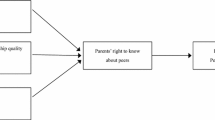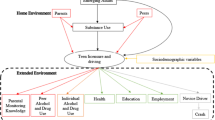Abstract
Adolescent and parent organ donation attitudes, knowledge, communications, and donor card signing rates were assessed. Parent-adolescent dyads (N = 137) were recruited at a Department of Motor Vehicles (DMV). Using discriminant analysis, attitude, knowledge, and communication variables adequately classified adolescent donor status. Overall, adolescent positive attitude toward donation was the most powerful variable discriminating between donors and nondonors. Examining only participants who had discussed donation with parents, the nature of parent-adolescent discussions about organ donation became the most important variable in donor classification. Adolescent donors reported significantly more positive and less negative attitudes, had parents with more positive and less negative attitudes, and had engaged in more frequent and more positive communications with parents about organ donation.
Similar content being viewed by others
References
Alleman, K., Collican, M., Savaria, D., Swanson, M., and Townsend, M. (1996). Public perceptions of an appropriate donor card/brochure. J. Transplant Coordinat. 6: 105–108.
Bernstein, D. M., and Simmons, R. G. (1974). The adolescent kidney donor: The right to give. Am. J. Psychiatry 131: 1338–1343.
Cacioppo, J., and Gardner, W. (1993). What underlies medical donor attitudes and behavior? Health Psychol. 12: 269–271.
Cleveland, S. E., and Johnson, D. L. (1970). Motivation and readiness of potential human tissue donors and nondonors. Psychosomat. Med. 32: 225–231.
Comazzi, A., and Invernizzi, G. (1972). A study of students’ emotional reactions regarding organ donation. Medicina Psicosomatica 17: 215–222.
Dew, M. A., Goycoolea, J. M., Stukas, A. A., Switzer, G. E., Simmons, R. G., Roth, L. H., and DiMartini, A. (1998). Temporal profiles of physical health in family members of heart transplant recipients: Predictors of health change during caregiving. Health Psychol. 17: 138–151.
Ford, L., and Smith, S. (1991). Memorability and persuasiveness of organ donation message strategies. Am. Behav. Scientist 34: 695–711.
Franz, H., DeJong, W., Wolf, S., Nathan, H., Payne, D., Reitsma, W., and Beasley, C. (1997). Explaining brain death: A critical feature of the donation process. J. Transplant Coord. 7: 14–21.
Gallup Organization. (1993). The American Public’s Attitudes Toward Organ Donation and Transplantation. The Partnership for Organ Donation, Boston, MA.
Gibson, V. (1996). The factors influencing organ donation: A review of the research. J. Adv. Nursing 23: 353–356.
Hair, J. F., Andersen, R. E., Tatham, R. L., and Black, W. C. (1995). Multivariate Data Analysis, 4th edn. Prentice Hall, Upper Saddle River, NJ.
Harris, R., Jasper, J., Lee, B., and Miller, K. (1991). Consenting to donate organs: Whose wishes carry the most weight? J. Appl. Social Psychol. 21: 13–24.
Harris, J., Jasper, J., Shanteau, J., and Smith, S. (1990). Organ donation consent decisions by the next of kin: An experimental simulation approach. In Shanteau, J. and Harris, R. (Eds.), Organ Donation and Transplantation: Psychological and Behavioral Factors, American Psychological Association, Washington, DC, pp. 13–24.
Holtkamp, S. (1997). The donor family experience: Sudden loss, brain death, organ donation, grief and recovery. In Chapman, J., Deierhoi, M., and Wight, C. (Eds.), Organ and Tissue Donation for Transplantation, Oxford University Press, New York, pp. 304–322.
Horton, R., and Horton, P. (1991). A model of willingness to become a potential organ donor. Soc. Sci. Med. 33: 1037–1051.
Horton, R., and Horton, P. (1990). Knowledge regarding organ donation: Identifying and overcoming barriers to organ donation. Soc. Sci. Med. 31: 791–800.
Jasper, J., Harris, R., Lee, B., and Miller, K. (1991). Organ donation terminology: Are we communicating life or death? Health Psychol. 10: 34–41.
Kopfman, J. E., and Smith, S. W. (1996). Understanding the audiences of a health communication campaign: A discriminant analysis of potential organ donors based on intent to donate. J. Appl. Commun. Res. 24: 33–49.
Lange, S. (1992). Psychosocial, legal, ethical, and cultural aspects of organ donation and transplantation. Crit. Care Nurs. Clinics North Am. 4: 25–42.
Parisi, N., and Katz, I. (1986). Attitudes toward posthumous organ donation and commitment to donate. Health Psychol. 5: 565–580.
Radecki, C., and Jaccard, J. (1997). Psychological aspects of organ donation: A critical review and synthesis of individual and next-of-kin donation decisions. Health Psychol. 16: 183–195.
Riether, A. M., and Mahler, E. (1995). Organ donation. Psychiatric, social, and ethical considerations. Psychosomatics 36: 336–343.
Rubens, A. J. (1996). Racial and ethnic differences in students’ attitudes toward organ donation. J. Nat. Med. Assoc. 88: 417–421.
Rubens, A. J., Oleckno, W. A., and Ciesla, J. R. (1998). Knowledge, attitudes, and behaviors of college students regarding organ/tissue donation and implications for increasing organ/ tissue donors. College Student J. 32: 167–178.
Sanner, M. (1994). Attitudes toward organ donation and transplantation: A model for understanding reactions to medical procedures after death. Soc. Sci. Med. 38: 1141–1152.
Sarason, I. G., Sarason, B. R., Pierce, G. R., and Shearin, E. N. (1991). A social learning approach to increasing blood donations. J. Appl. Soc. Psychol. 21: 896–918.
Scherer, D. G. (1991). The capacities of minors to exercise voluntariness in medical treatment decisions. Law Human Behav. 15: 431–449.
Simmons, R. G., Fulton, J., and Fulton, R. (1972). The prospective organ transplant donor: Problems and prospects of medical innovation. Omega 3: 319–339.
Smith, K. L., and Braslow, J. R. (1997). Public attitudes toward organ and tissue donation. In Chapman, J., Deierhoi, M., and Wight, C. (Eds.), Organ and Tissue Donation for Transplantation, Oxford University Press, New York, pp. 34–45.
Thompson, V. S. (1993). Educating the African-American community on organ donation. J. Nat. Med. Assoc. 85: 17–19.
Thompson, N. M., Knudson, R., and Scully, G. (1997). Education in schools. In Chapman, J., Deierhoi, M., and Wight, C. (Eds.), Organ and Tissue Donation for Transplantation, Oxford University Press, New York, pp. 400–411.
United Network for Organ Sharing, UNOS. (2004). UNOS Critical Data, [Online]. Available: http://www.unos.org.
Weiss, A. H. (1996). Asking about asking: Informed consent in organ donation research. IRB: A Review of Human Subjects Research 18: 6–10.
Wheeler, M. S., and Cheung, A. (1996). Minority attitudes toward organ donation. Crit. Care Nurse 16: 30–35.
Williams, A. F. (1985). Nighttime driving and fatal crash involvement of teenagers. Accident Anal. Prev. 17: 1–5.
Williams, A. F. (1998). Risky driving behavior among adolescents. In Jessor, R. (Ed.), New Perspectives on Adolescent Risk Behavior, Cambridge University Press, New York, pp. 221–237.
Yuen, C., Burton, W., Chiraseveenuprapund, P., Elmore, E., Wong, S., Ozuah, P., and Mulvihill, M. (1998). Attitudes and beliefs about organ donation among different racial groups. J. Nat. Med. Assoc. 90: 13–18.
Author information
Authors and Affiliations
Corresponding author
Rights and permissions
About this article
Cite this article
Sirois, B.C., Sears, S.F. & Marhefka, S. Do New Drivers Equal New Donors? An Examination of Factors Influencing Organ Donation Attitudes and Behaviors in Adolescents. J Behav Med 28, 201–212 (2005). https://doi.org/10.1007/s10865-005-3669-y
Accepted:
Issue Date:
DOI: https://doi.org/10.1007/s10865-005-3669-y




